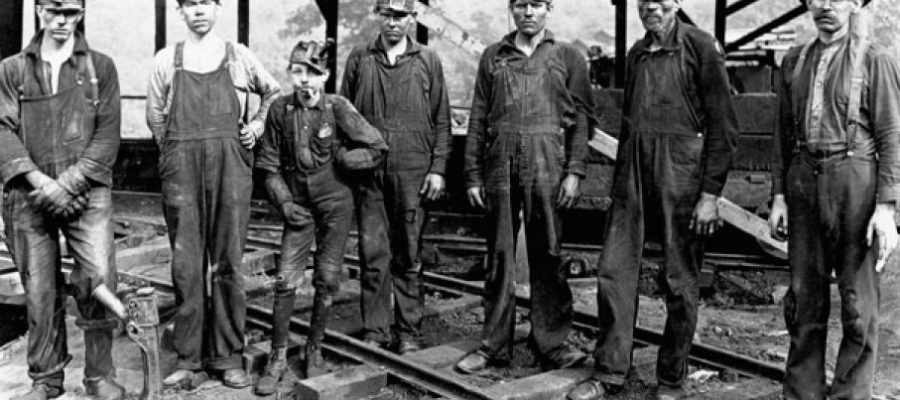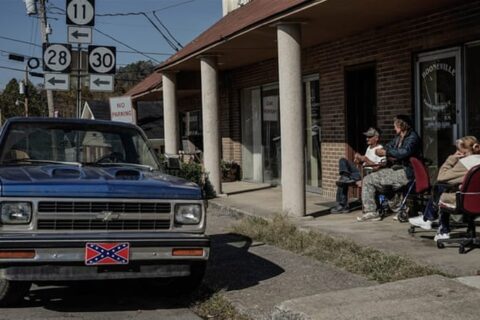One result of the Yankee victory in the War of Northern Aggression that tends to be overlooked is the effect it had on Appalachia. Typically, when the story of the War and Appalachia is told historians tend to focus, usually overstating, the amount of Appalachian opposition to the Confederacy. The truth is that the Confederacy was far more popular than most left-wing historians are willing to admit. For example, in what is now West Virginia, secession from the Union was very popular. A much larger and more real impact of the War on the region was the birth of the horrible conditions the coalminers faced due to Yankee industrialists.
With the fall of the Confederacy and with that the end of the aristocratic Dixian ruling class, Yankee industrialists saw an opportunity to move in. In turn, they would buy up land in the region and forcing the natives to work in the coalmines. And indeed, through lies and manipulation, that is exactly what happened. So, within a few decades after the end of the War, coal country was no longer owned by the native Dixians who lived there, but by Yankee companies who proceeded to brutally exploit the land and her people.
During the Dixian aristocracy Appalachians may have been poor, but they were at least independent. Now, in the postbellum period, they had been reduced practically to serfdom on land their grandfathers once called their own. I want to be careful here not to overstate the poverty of the region that long predated the Yankees. It is a tough land to scratch out a living. But, the fact remains that they were an independent people, something they would lose in the 20th century. Unfortunately, Appalachians were turned from poor, yet proud, farmers and hunters to cogs in a giant industrial machine, subjected to dirty, dangerous work. Cave-ins and explosions were common and if that did not kill you, black lung would be in your future.
By the 1920s, there finally was pushback. The miners attempted armed rebellion, but it cost them dearly. When they rose up, President Warren Harding, yet another Yankee Republican, sent in the army. They even had bombs dropped on them from airplanes. Apart from our War for Independence, this is the largest uprising in American history. While they never were able to recover their lost independence, they were able to earn better working conditions and pay, allowing them to better provide for their families.
Despite the victories gained, in many ways it was short lived. As regulations began to destroy the mining industry, jobs were lost with nothing in return, except low paying retail. To make matters worse, because of the nature of the work, injuries were common. And, as the jobs dried up, new Yankee companies, this time the pharmaceutical industry, launched a campaign to move highly addictive opioids into the region. Naturally, they fraudulently marketed their product as “non-addictive.” We see the results now – a massive addiction crisis that has destroyed many lives, not just in Appalachia, but all over the South.
What has happened to Appalachia, with first Yankee industrialists and then Big Pharma, shows a very clear line of distinction between the true, nationalist Right and the disingenuous, corporatist Right. Our loyalties are to our people and to their betterment, not to a corporation’s profit line or a company’s theoretical concept of rights. Yet, I have debated people who insist that the pharmaceutical industry did nothing wrong and defend them, even as they committed both fraud and bribery. Their first impulse is to defend big business, thinking this is conservatism.
It is the same impulse that causes them to defend the importation of cheap labor, which ends up destroying the working class’ ability to earn a family wage, driving down the native birthrate and causing a demographic shift to occur even earlier. This is the sort of conservatism that not only fails to actually conserve anything, but actually works to undermine the traditional order of our society far more quickly. It is an impulse that we must resist, the identification of our interests with corporate interests has been a disaster for us.
Our greatest minds and leaders knew better and so should we, this is why men like George Wallace would attack big business. He, unlike the Chamber of Commerce lapdogs, knew that his loyalty was to his people, not to capitalism. Remember, in 1968 Wallace was attacked on the pages of the National Review as a “Country and Western Marxist” because he would not tow their neoliberal, corporatist line. More tellingly, William Buckley attacked him for supporting differing economic policies if those policies would benefit Dixie. But, that was the point, Wallace knew that his loyalty was to his people and what his people needed might not be reduced into a single set of dogmatic economic principles.
Appalachia needs nationalists that care about her people, not corporate, Yankee (or native) stooges.
-By Dixie Anon

O I’m a good old rebel, now that’s just what I am. For this “fair land of freedom” I do not care at all. I’m glad I fit against it, I only wish we’d won, And I don’t want no pardon for anything I done.



Lots of truth in this article. The people here were finally making good money. every miner had a good house, and could afford a plot of land to go with it. then they killed the industry. Deregulation could have saved it but by 2010 there was no hope. there was a brief natural gas boom but that didn’t last long.
I was born in 1998 and can just barely remember the tail end of the last coal boom. everyone had a job. there were lots of local businesses that were supported by the money the coal industry brought to the county. The county got millions in coal severance tax each year. We had good roads. and good infrastructure.
when the mines closed all those local businesses lost their base of support. no jobs no money. The department store on main street closed. all the various mining machine and tool shops closed. That million dollar severance tax disappeared. The only road that gets maintained now is the state highway. The county can even afford to salt the roads in winter now. The county’s bridges are ancient and collapsing. there is no money to replace them.
As to support of the confederacy during the war, it was high here in eastern Kentucky. 631 men enlisted in my county and fought in Virginia and some would ride with General Morgan on his great raid. We had a field hospital here as well. The Yankees were cruel here when they finally took control. People were bayoneted and shot for just being suspected supporters. There was a old cabin that stood near here until recently that still had .58 caliber bullet holes in it. You can still see the confederate fortification on the border with Virginia, a 5 foot high stone wall that is 3 feet thick. it isn’t marked for some reason and its too far off the modern crossing to be a tourist attraction.
Unfortunately, we don’t have real statesmen anymore, who will defend Dixie to the hilt, caring not for Yankee approval or opinion.
What happened to the “like” button that we had on this site for years? Many of these authors and comments deserve a supportive nod.